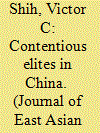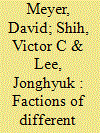|
|
|
Sort Order |
|
|
|
Items / Page
|
|
|
|
|
|
|
| Srl | Item |
| 1 |
ID:
145825


|
|
|
|
|
| Summary/Abstract |
The purges of former Politburo Standing Committee member Zhou Yongkang, former Central Military Commission Vice Chairman Xu Caihou, and the former head of the Central Committee Office Ling Jihua in 2014 re-excited a long-standing debate in the field of elite Chinese politics: how contentious is politics at the elite level? On the face of it, these purges, as well as the arrests of ninety nine senior officials associated with these three individuals and with other cases, seem to prove that elite politics remains highly contentious at the top (People's Daily 2015). This outcome was surprising considering that decades of institution building had taken place after the Cultural Revolution. However, proponents of institutionalized politics in the CCP argue that the leadership had a genuine desire to clean house, and that these arrests, even if politically motivated, instilled a renewed discipline in the party. Once the “bad apples” were eliminated, the leadership under Xi Jinping would have continued on the road of institutionalization (Li 2014). Cadre promotion institutions, regular meetings of the Politburo and its standing committee, party congresses, and retirement rules remain largely unaffected by the purges and will continue to ensure relatively harmonious decision making and predictable successions in the foreseeable future.
|
|
|
|
|
|
|
|
|
|
|
|
|
|
|
|
| 2 |
ID:
145827


|
|
|
|
|
| Summary/Abstract |
The literature on faction suggests that patrons in the party may recruit faction members on the basis of a broad range of shared traits and experience. Some scholars argue reasonably that with increasing specialization of officials, factions are increasingly dominated by those with shared work experience in a set of bureaucracies. Although this trend may be true in general, senior leaders may still recruit those with whom they share birth place and school ties into their factions. To investigate this, we first derive four reasonable ways of measuring factional ties as suggested by the literature. We then explore the factional recruitment strategy pursued by each reform-era (1978–present) party secretary generals of the CCP by evaluating the measures of factional ties which predicted their clients’ promotions to full Central Committee membership. Our results show that Hu Yaobang, Jiang Zemin, and Xi Jinping pursued broadly based factional recruitment strategies, while Hu Jintao recruited faction members mainly from work colleagues. We further uncover signs that the party institutions may allow deposed secretary generals some measure of influence over promotions even after their political demise. At the same time, strict retirement rules on lower level officials gave rise to a cohort effect that gave the general secretary greater influence over the promotion of alternate Central Committee members to the full Central Committee during their first term than in subsequent terms.
|
|
|
|
|
|
|
|
|
|
|
|
|
|
|
|
|
|
|
|
|